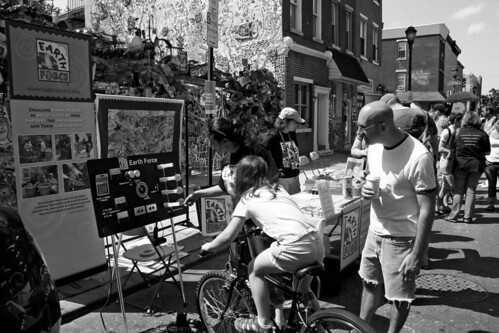These days, green is everywhere.
We eat hummus and pita sandwiches from the Sexy Green Truck while reading Philadelphia Weekly’s green issue and we wipe our butts with Seventh Generation brand eco-friendly toilet paper. We also worry about our carbon footprints almost as much as we worry about the Starbucks in the TECH Center closing when we need it most. While we’re on the subject, why doesn’t Starbucks recycle?
In this post-An Inconvenient Truth world, being a friend to the environment is more respectable and hip than ever. But what exactly makes a person green, and does the hair spray you use in the morning cancel out the bike riding you do? Does it matter if you buy green toilet paper if you also smoke cigarettes and throw old syllabi in the trash?

That’s where the Urban Green Partnership comes in.
UGP was founded in Philadelphia in 2006 by a handful of eco-activists who sensed that people in the city were confused about how to go green. Now, with an official five-member staff and a small, but dedicated crew of interns and volunteers, they’re ready to tackle the challenge of making Philly a greener place to live.
The group wanted to make information about sustainability accessible to everyone, so it began working on EcoNexus, a Web site devoted to the collection and redistribution of data about green products and businesses. While not available to the public just yet, EcoNexus will eventually help consumers make smarter choices when buying green products. The Web site will display prices, discuss quality and evaluate the overall greenness of products. EcoNexus will also help cut back on shopping time, allowing people to do their research before they hit the stores.
“If you want to get people to go green, you’ve got to make it as easy and convenient as possible,” said JJ Biel-Goebel, one of UGP’s co-founders and its current board president.
GreenFest Philly is another project developed by UGP. The annual one-day festival is a celebration of all things good for the Earth. This year’s GreenFest, which took place on Sept. 7 at Second and South streets, attracted a crowd of more than 20,000 people to its many booths and exhibits. Activities included sneaker recycling, yoga and an organic baking contest. Vendors sold everything from vegetarian food to vintage clothing, to art and jewelry made from recycled materials.
“It’s a fun and immediate way to fulfill our mission,” said Jennifer Bendik, a GreenFest co-director and active member of UGP. “We can teach people about green living in a way that’s exciting and effective.”
Bendik, who graduated from Temple in 1999, has been a vegetarian for 18 years and is passionate about doing whatever she can to save the environment. As she sees it, global warming and pollution are issues that still need to be addressed, despite the recent trend toward greenness.
“A lot of people don’t realize that [being green] goes beyond just recycling and some people don’t even know how to properly do that,” Bendik said.
“The biggest thing we can do to make a change in the world is to make people more aware,” said Amy Hollaman, the volunteer coordinator for GreenFest Philly.
Of course, UGP does more than just educate. In addition to developing EcoNexus and planning GreenFest, the organization is also working to build the most eco-friendly building in the city. The Big Green Building will be both a commercial and residential space that will recycle its own water and use only clean energy for heat and electricity. UGP is currently working to finance the project, which should be under way by October 2009.
It’s hard for me to imagine a world in which people live in total Captain Planet-style harmony with the Earth, but UGP is optimistic. After all, the green bandwagon is getting pretty crowded – and the movement shows no signs of slowing down just yet.
“Regardless of any of our other beliefs, we all want the planet to be here for as long as possible,” Hollaman said. “So, in a way, ‘going green’ is a nonpartisan kind of thing. Anyone can get involved, and people are. It’s bringing us together as a country.”
Anna Hyclak can be reached at anna.hyclak@temple.edu.



Be the first to comment